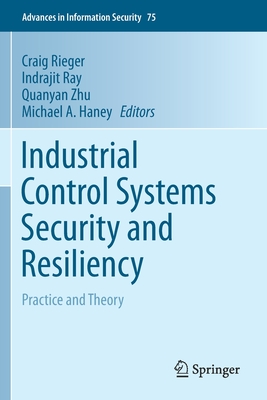Industrial Control Systems Security and Resiliency: Practice and Theory
暫譯: 工業控制系統安全與韌性:實務與理論
Rieger, Craig, Ray, Indrajit, Zhu, Quanyan
- 出版商: Springer
- 出版日期: 2019-10-30
- 售價: $6,820
- 貴賓價: 9.8 折 $6,683
- 語言: 英文
- 頁數: 200
- 裝訂: Hardcover - also called cloth, retail trade, or trade
- ISBN: 3030182134
- ISBN-13: 9783030182137
-
相關分類:
Penetration-test
海外代購書籍(需單獨結帳)
商品描述
This book provides a comprehensive overview of the key concerns as well as research challenges in designing secure and resilient Industrial Control Systems (ICS). It will discuss today's state of the art security architectures and couple it with near and long term research needs that compare to the baseline. It will also establish all discussions to generic reference architecture for ICS that reflects and protects high consequence scenarios.
Significant strides have been made in making industrial control systems secure. However, increasing connectivity of ICS systems with commodity IT devices and significant human interaction of ICS systems during its operation regularly introduces newer threats to these systems resulting in ICS security defenses always playing catch-up. There is an emerging consensus that it is very important for ICS missions to survive cyber-attacks as well as failures and continue to maintain a certain level and quality of service. Such resilient ICS design requires one to be proactive in understanding and reasoning about evolving threats to ICS components, their potential effects on the ICS mission's survivability goals, and identify ways to design secure resilient ICS systems.
This book targets primarily educators and researchers working in the area of ICS and Supervisory Control And Data Acquisition (SCADA) systems security and resiliency. Practitioners responsible for security deployment, management and governance in ICS and SCADA systems would also find this book useful. Graduate students will find this book to be a good starting point for research in this area and a reference source.
商品描述(中文翻譯)
本書提供了設計安全且具韌性的工業控制系統(Industrial Control Systems, ICS)所面臨的主要關注點及研究挑戰的全面概述。它將討論當前最先進的安全架構,並結合與基準相比的近期和長期研究需求。書中還將所有討論建立在反映並保護高後果情境的ICS通用參考架構上。
在確保工業控制系統安全方面已取得顯著進展。然而,ICS系統與商用IT設備的連接性不斷增加,以及在運行過程中與人類的顯著互動,經常為這些系統引入新的威脅,導致ICS安全防禦始終處於追趕狀態。業界逐漸達成共識,認為ICS任務在遭受網路攻擊及故障時能夠生存並持續維持一定的服務水平和質量是非常重要的。這種韌性的ICS設計要求主動理解和推理ICS組件的演變威脅、這些威脅對ICS任務生存目標的潛在影響,並找出設計安全韌性ICS系統的方法。
本書主要針對從事ICS及監控控制與數據採集(Supervisory Control And Data Acquisition, SCADA)系統安全與韌性研究的教育工作者和研究人員。負責ICS和SCADA系統安全部署、管理和治理的實務工作者也會發現本書的實用性。研究生將會發現本書是該領域研究的良好起點和參考來源。
作者簡介
Craig Rieger is the Chief Control Systems Research Engineer at the Idaho National Laboratory (INL), pioneering multidisciplinary research in the area of next generation resilient control systems. In addition, he has organized and chaired nine Institute of Electrical and Electronics Engineers (IEEE) technically co-sponsored symposia and one National Science Foundation workshop in this new research area, and authored more than 40 peer-reviewed publications. He received his PhD in Engineering and Applied Science from Idaho State University in 2008. He is a senior member of IEEE, and has 20 years of software and hardware design experience for process control system upgrades and new installations. He has also been a supervisor and technical lead for control systems engineering groups having design, configuration management, and security responsibilities for several INL nuclear facilities and various control system architectures.
Indrajit Ray is a Professor at the Computer Science Department at Colorado State University. He received his PhD in Information Technology from George Mason University in Fairfax, VA in 1997. His main research interests are in the areas of data and application security, network security, security modeling, risk management, trust models, privacy and digital forensics. He is a member of the Data and Applications Security Group, the Network Security Group, and the Software Assurance Laboratory at Colorado State University. His research has been funded by the U.S. National Science Foundation, the Air Force Office of Scientific Research, the Air Force Research Laboratory and the Federal Aviation Administration. He is a member of IEEE Computer Society, ACM, ACM Special Interest Group on Security Audit and Control, IFIP WG 11.3 on Data and Applications Security and IFIP WG 11.9 on Digital Forensics.
Quanyan Zhu is an Assistant Professor at the Department of Electrical and Computer Engineering at the Polytechnic School of Engineering at the New York University, NY, USA. He received his PhD in Electrical and Computer Engineering from the University of Illinois at Urbana-Champaign in 2013. His main research interests are in the areas of Game Theory and Applications, Resilient and Secure Socio-Cyber-Physical Systems, Adversarial Machine Learning and Signal Processing, Human-Robot Interactions, Internet of Things, Game and Decision Theory for Cyber Security, Economics and Optimization of Infrastructure Systems, and Resource Allocations in Communication Networks.
Michael Haney is an Assistant Professor of Computer Science for the University of Idaho and a cybersecurity researcher for the Idaho National Laboratory. He received his master's and doctorate in computer science from the University of Tulsa in 2013 and 2015, respectively. Currently, his research interests are in data visualization, specifically visualizing network and system log data to improve intrusion detection and response for large-scale networks. He studies cyber-security issues of energy assurance supporting a more resilient "smart" infrastructure. His focus here lies in honeypot research -- creating systems that mimic real power generation systems, oil refineries or water treatment plants, and recording and studying the cyber-attacks against these systems.
作者簡介(中文翻譯)
克雷格·里格(Craig Rieger)是愛達荷國家實驗室(Idaho National Laboratory, INL)的首席控制系統研究工程師,專注於下一代韌性控制系統的多學科研究。此外,他組織並主持了九場由電氣與電子工程師學會(Institute of Electrical and Electronics Engineers, IEEE)技術共同贊助的研討會以及一場國家科學基金會(National Science Foundation)工作坊,並在這一新研究領域發表了超過40篇經過同行評審的出版物。他於2008年在愛達荷州立大學獲得工程與應用科學博士學位。他是IEEE的資深會員,擁有20年的過程控制系統升級和新安裝的軟體及硬體設計經驗。他還曾擔任控制系統工程團隊的主管和技術負責人,負責多個INL核設施的設計、配置管理和安全性。
印德拉吉特·雷(Indrajit Ray)是科羅拉多州立大學(Colorado State University)計算機科學系的教授。他於1997年在維吉尼亞州費爾法克斯的喬治梅森大學(George Mason University)獲得資訊技術博士學位。他的主要研究興趣包括數據和應用安全、網絡安全、安全建模、風險管理、信任模型、隱私和數位取證。他是科羅拉多州立大學數據與應用安全小組、網絡安全小組和軟體保證實驗室的成員。他的研究得到了美國國家科學基金會、空軍科學研究辦公室、空軍研究實驗室和聯邦航空管理局的資助。他是IEEE計算機學會、ACM、ACM安全審計與控制特別興趣小組、IFIP WG 11.3(數據與應用安全)和IFIP WG 11.9(數位取證)的成員。
朱全彥(Quanyan Zhu)是美國紐約大學(New York University)工程學院電氣與計算機工程系的助理教授。他於2013年在伊利諾伊大學香檳分校(University of Illinois at Urbana-Champaign)獲得電氣與計算機工程博士學位。他的主要研究興趣包括博弈論及其應用、韌性和安全的社會-網絡-物理系統、對抗性機器學習和信號處理、人機互動、物聯網、網絡安全的博弈與決策理論、基礎設施系統的經濟學與優化,以及通信網絡中的資源分配。
邁克爾·哈尼(Michael Haney)是愛達荷大學(University of Idaho)計算機科學的助理教授,也是愛達荷國家實驗室的網絡安全研究員。他於2013年和2015年分別在塔爾薩大學(University of Tulsa)獲得計算機科學碩士和博士學位。目前,他的研究興趣集中在數據可視化,特別是可視化網絡和系統日誌數據,以改善大規模網絡的入侵檢測和響應。他研究支持更韌性「智慧」基礎設施的能源保障的網絡安全問題。他的研究重點在於蜜罐研究——創建模擬真實發電系統、石油煉油廠或水處理廠的系統,並記錄和研究針對這些系統的網絡攻擊。










